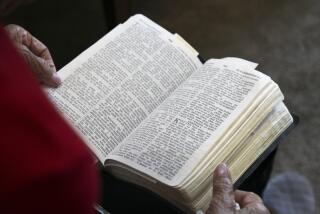A Scholarly Look at the Bible as History
- Share via
Are the stories of the Bible “true”?
Nearly every Sunday school child has, eventually, asked that question. Half a millennium ago, the answer was simple. But ever since the scholars of the Enlightenment began attacking biblical literalism, the response has grown complex.
It would be unfair to expect the 13 distinguished scholars assembled by Oxford University Press for this volume to make the matter easy again. They succeed, however, in making the evidence, in all its glorious complexity, comprehensible.
Neither extreme in the debate over the historicity of the Bible will be satisfied. In the minds of biblical literalists, there is no debate. As the bumper sticker declares: “God Said It. I Believe It. That Settles It.” At the other pole, a school of Bible scholars who reject all talk of the Bible as history are equally dogmatic.
At one level, that debate ought, simply, to be irrelevant. One can accept as a matter of faith that one God, not a passel of idols, rules the universe and demands ethical conduct from human beings even if no man named Moses ever ascended Mt. Sinai. The story of David and Bathsheba carries a moral sting today regardless of whether they ever existed in the too-ardent flesh and blood.
Yet the question continues to fascinate. In the Middle East, every shard of archeological discovery has its impact on the struggle for turf and historical validation. Further from the arena of conflict, we long to know the story behind the stories. Who were these people who bequeathed us the book that shaped Western civilization?
“The Oxford History of the Biblical World” surveys those people, their lives and their times from the earliest prehistory of the Near East through the first several centuries of the Christian Era and the dawning of Islam. It is scholarly--veering toward pedantic in a few of the denser chapters--careful and studiously middle of the road.
For example, on the question of the Exodus from Egypt--the shaping event in the traditions of Judaism--Carol Redmount, associate professor of Egyptian and Syro-Palestinian Archeology at Berkeley, notes that neither the biblical text nor the archeological record contains clear evidence that identify the century or setting of the escape from slavery. Within the text, “possible historical data are mostly inconsistent, ambiguous or vague.” Outside the text, “years of the most intensive scrutiny have failed to produce a single unequivocal, or even generally accepted, non-biblical historical reference” to the Scriptural events.
And yet, archeological evidence also makes it clear that peoples from the Near East did periodically migrate to Egypt and sojourn there. Some were worked as slaves. A few rose to positions of prominence much like the biblical Joseph.
Surveying and critiquing each of the major Exodus theories, Redmount delivers a cautious verdict on the Scriptural text: “Significant portions are not and were never intended to be historiographic.” Ancient peoples freely mixed the categories “myth” and “fact” that we see as distinct. “Yet the overall intent of the narrative was historical,” she adds. “Ultimately, it is this compelling historical grounding of the narrative that sustains most scholars’ belief in the actual historical origin for the Exodus events.”
Some chapters are less immediately accessible to non-scholarly readers. Lawrence E. Stager, Dorot professor of the Archeology of Israel and director of the Semitic Museum at Harvard offers a discussion of pottery.
Because pottery breaks and our ancestors, much like us moderns, threw out broken dishes, ancient bowls and pots are chief sources of evidence for archeologists, he says. The distribution of the red and black bowls and jugs known to archeologists as Philistine bichrome ware, for example, allow scholars to trace the migrations of ancient peoples. The subject is important, but his detail is apt to daunt nonspecialist readers.
Other chapters, however, will attract, and deserve, a broad readership. In one of the book’s final chapters, for example, Daniel N. Schowalter, associate professor of religion at Carthage College, describes the intertwined histories of Judaism and early Christianity, exploring the origins of tensions that have never yet disappeared.
Copiously--at times beautifully--illustrated and detailed with more than a score of descriptive maps, “The Oxford History of the Biblical World” rewards careful study and casual browsing. For those willing to open their minds to evidence and nuanced argument about the origins of faiths that have shaped our world, it is a worthy investment of time in the study of the timeless.
Lauter is specialist editor of The Times.
More to Read
Sign up for our Book Club newsletter
Get the latest news, events and more from the Los Angeles Times Book Club, and help us get L.A. reading and talking.
You may occasionally receive promotional content from the Los Angeles Times.









